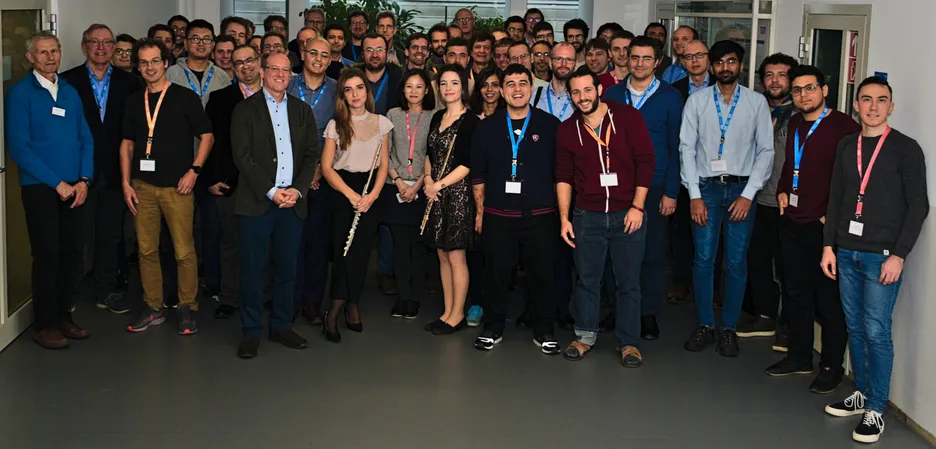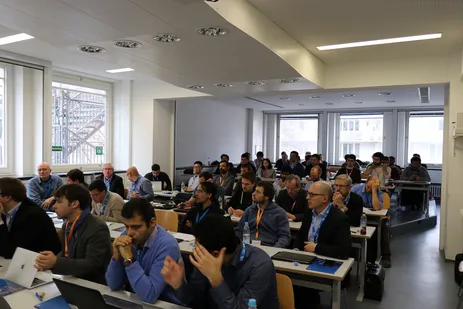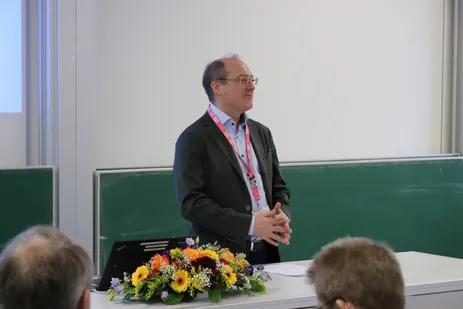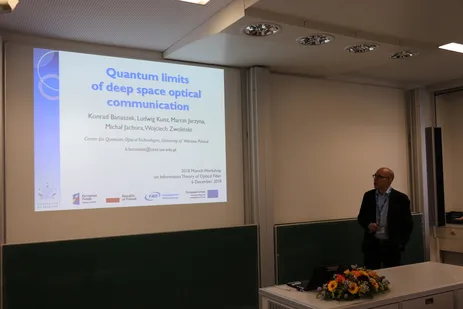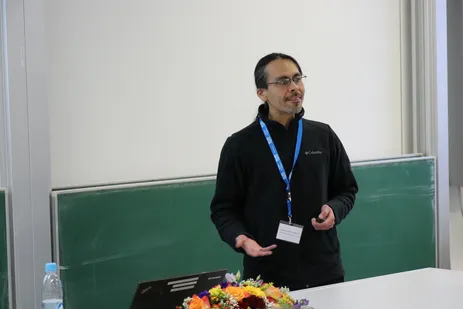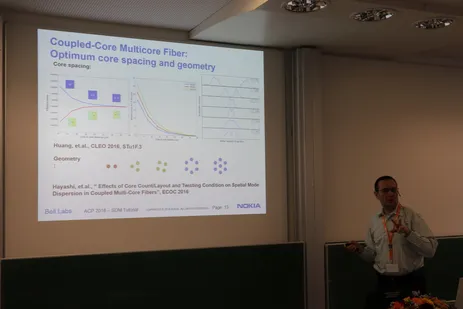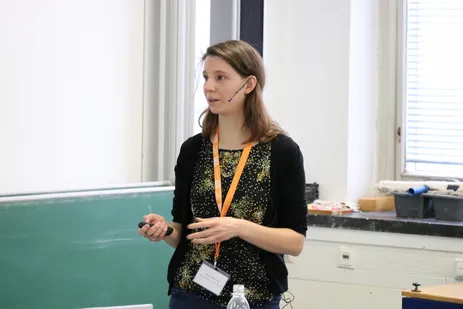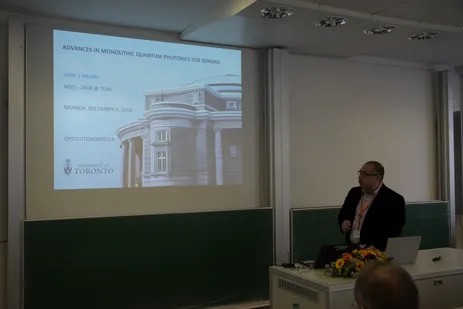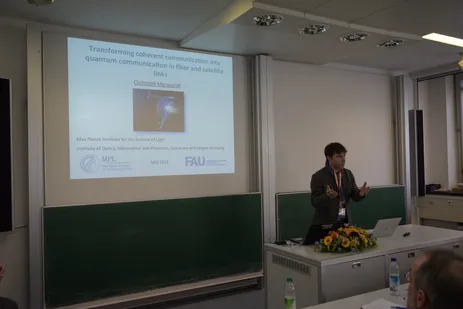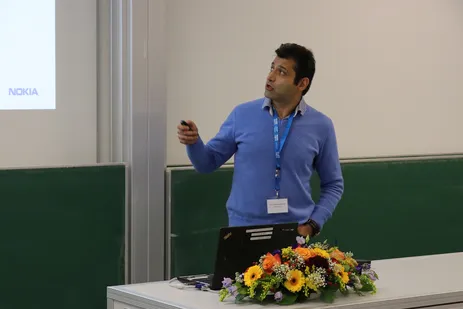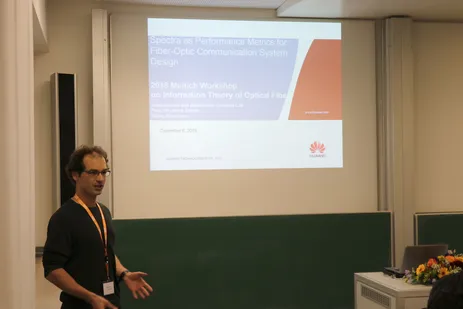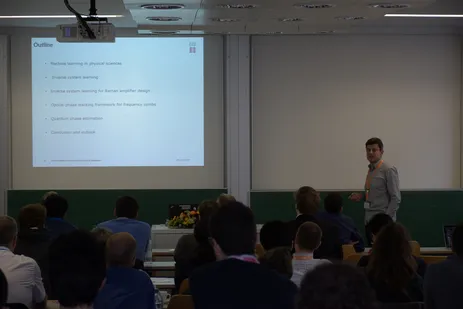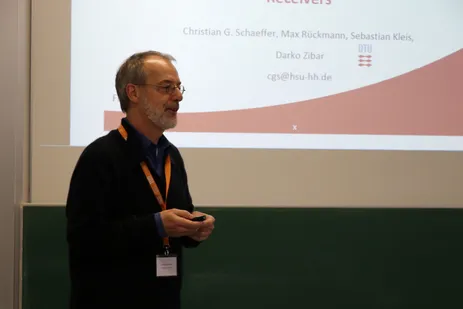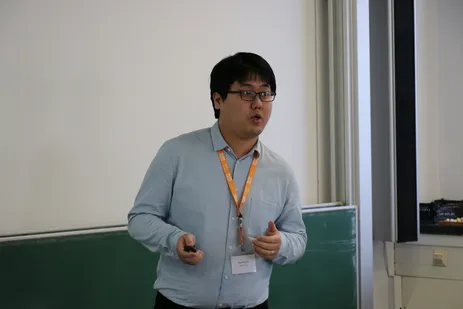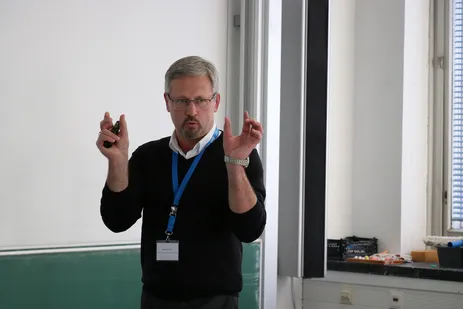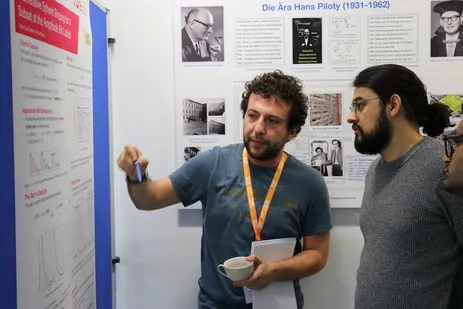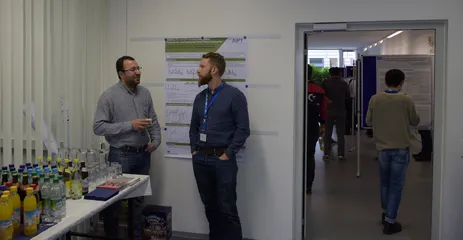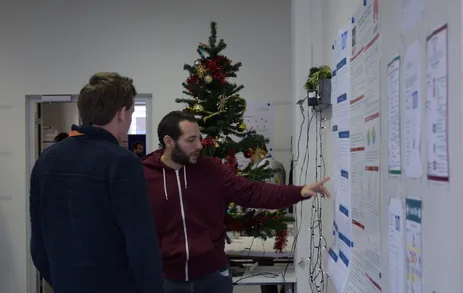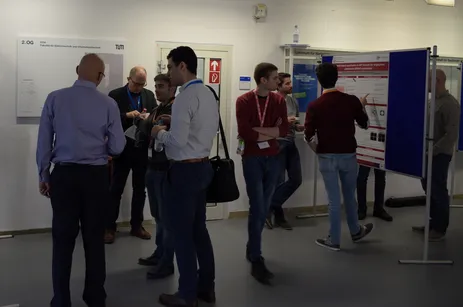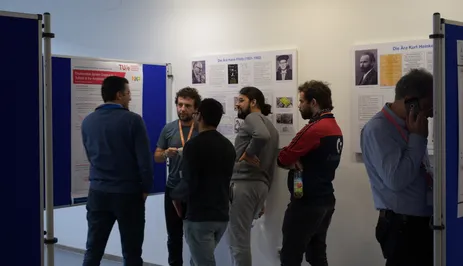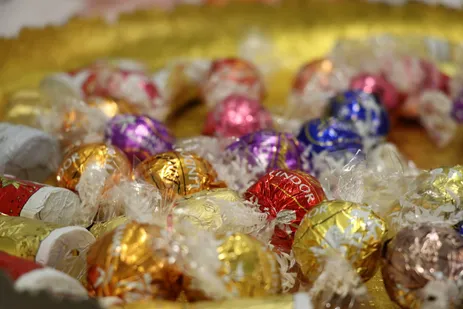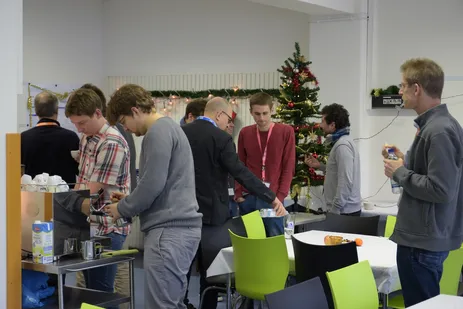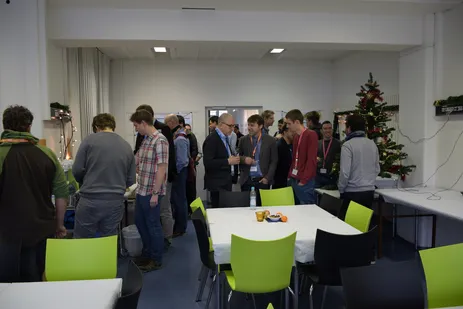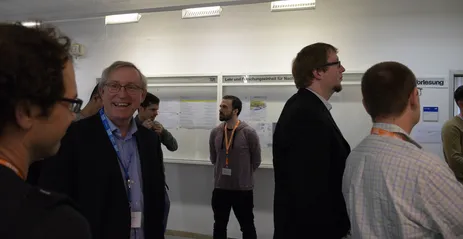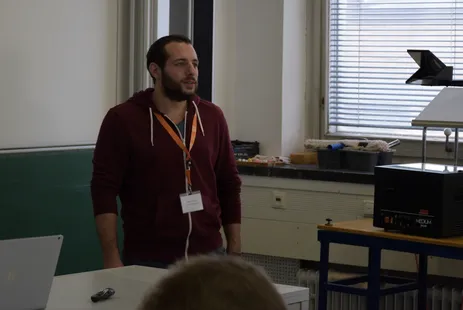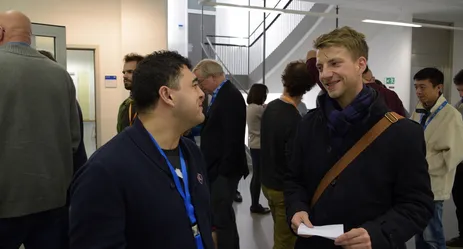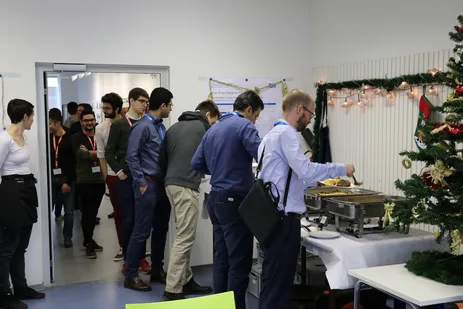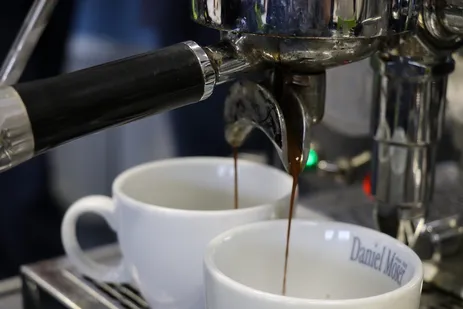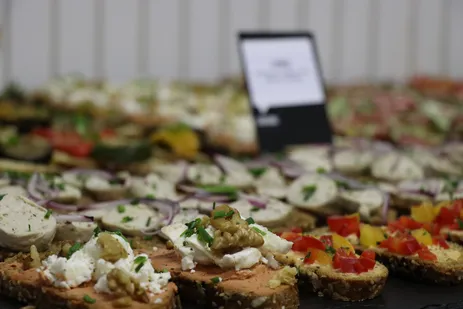2018 Munich Workshop on Information Theory of Optical Fiber (MIO)
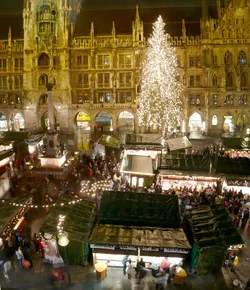
On December 6-7, 2018, the TUM Institute for Communications Engineering is organizing the 2018 Munich Workshop on Information Theory of Optical Fiber (MIO 2018). The workshop will bring together researchers from the fields of information theory and optical fiber to explore new ideas. Emphasis is placed on theory, especially how fiber nonlinearities affect channel capacity, and on experimental work that leads to new insight. The workshop should promote interaction and collaboration among the participants.
We look forward to seeing you in Munich!
Javier García, Benedikt Leible, René Essiambre, Gerhard Kramer
Presentation slides
Some of the slides used by the speakers in the MIO2018 are available for download here.
Topics of interest
- Capacity of fiber channels and networks
- Quantum communication and information
- Multi-mode optical communication
- Coded modulation and transceiver design
Confirmed Participants
- Francisco Elohim Becerra (Center for Quantum Information and Control)
- Darko Zibar, Søren Forchhammer, Nicola De Renzis, Henrik Enggaard Hansen, Shajeel Iqbal (Technical University of Denmark)
- Christian Schäffer, Max Rückmann (Helmut Schmidt Universität Hamburg)
- Christoph Marquardt (Max Planck Institute for the Science of Light)
- Georg Rademacher (NICT Japan)
- Amirhossein Ghazisaeidi, Roland Ryf, Henning Bülow, Vahid Aref, Laurent Schmalen, Yanni Ou (Nokia Bell Labs)
- Cristian Antonelli, Antonio Mecozzi (University of L'Aquila)
- Amr Helmy, Qun Zhang, Reza Rafie Borujeny, Frank Kschischang (University of Toronto)
- Konrad Banaszek, Ludwig Kunz (University of Warsaw)
- Mingming Tan, Abdallah Ali (Aston University)
- Yunus Can Gultekin, Vinícius Dias (Eindhoven University of Technology)
- Mark Shtaif (Tel Aviv University)
- Luca Barletta (Politecnico di Milano)
- Felix Frey (Universität Ulm)
- Georg Böcherer, Jan-Willem Goossens, Stefano Bettelli, Hans Brunner, Andreas Poppe, Lucian Comandar, David Hillerkuss (Huawei Technologies)
- Shrinivas Chimmalgi, Sander Wahls (Delft University of Technology)
- Jasmin Meinecke (Ludwig-Maximilians-Universität München)
- Arkady Shipulin, Franko Küppers (Skolkovo Institute of Science and Technology)
- Alexander Span (University of Stuttgart)
- Majid Safari (University of Edinburgh)
- Javier García, Benedikt Leible, Roberto Ferrara, Christian Deppe, Patrick Schulte, Heider Alkim, Mustafa Cemil Coşkun, Tasnad Kernetzky, Ginni Khanna, Onur Günlü, Delcho Donev, Stephen Diadamo, Sajad Saeedinaeeni, Minglai Cai, Janis Nötzel, Gerhard Kramer (TUM)
Program
Thursday, December 6
| 9:30 | Arrival |
| 9:50 | Welcome: Gerhard Kramer |
| Session 1 Quantum Communications 1 (Chair: Gerhard Kramer) | |
| 10:00 | Konrad Banaszek (University of Warsaw) |
| 10:30 | Francisco Elohim Becerra (Center for Quantum Information and Control) |
| 11:00 | Coffee break |
| Session 2 Fiber and Quantum Communications (Chair: Christian Deppe) | |
| 11:30 | Roland Ryf (Nokia Bell Labs) |
| 12:00 | Jasmin Meinecke (Ludwig-Maximilians-Universität München): Waveguides for Quantum Communication and Information |
| 12:30 | Lunch |
| Session 3 Quantum Communications 2 (Chair: Roberto Ferrara) | |
| 14:00 | Amr Helmy (University of Toronto) |
| 14:30 | Christoph Marquardt (Max Planck Institute for the Science of Light): Transforming coherent communication into quantum communication in fiber and satellite links |
| 15:00 | Coffee break |
| Session 4 Fiber Communications and Coding (Chair: Cristian Antonelli) | |
| 16:00 | Amirhossein Ghazisaeidi (Nokia Bell Labs) |
| 16:30 | Georg Böcherer (Huawei Technologies France) |
| 19:00 | Dinner at Löwenbräukeller Directions from LNT to Löwenbräukeller |
Friday, December 7
| Session 5 Machine Learning for Quantum Communications (Chair: Christian Schäffer) | |
| 9:30 | Darko Zibar (DTU Fotonik): Machine learning for Raman amplifier design and quantum phase estimation |
| 10:00 | Christian Schäffer (Helmut Schmidt Universität): Machine Learning in Heterodyne Quantum Receivers |
| 10:30 | Poster Session |
| 11:30 | Lunch |
| Session 6 Fiber Amplifiers (Chair: Javier García) | |
| 14:00 | Mingming Tan (Aston University): Distributed Raman Amplification for Combating Optical Nonlinearities in Fibre Transmission |
| 14:30 | Arkady Shipulin (Skolkovo Institute of Science and Technology): Hybrid EDFA/Raman optical in-line amplifiers and security on the physical level |
Poster presentations
There will be a two-hour poster session on Friday from 10:30-12:30. If you are interested in presenting a poster, please send an email to mio2018@lnt.ei.tum.de with a preliminary title. The recommended size of the posters is A0, either portrait or landscape. The following researchers will present a poster:
- Ludwig Kunz (University of Warsaw): Noisy propagation of coherent states in a lossy Kerr medium
- Yunus Can Gultekin (Eindhoven University of Technology): Enumerative sphere shaping for a subset of the amplitude bit labels
- Reza Rafie Borujeny (University of Toronto): A Bounded Noise Model for Nondispersive Optical Fiber
- Jan-Willem Goossens (Huawei Technologies France): Waveform Design and Transmission Based on the Periodic Nonlinear Fourier Transform
- Qun Zhang (University of Toronto): Improved Discrete Eigenvalue Estimation for Solitonic Inputs via the Continuous Spectrum
- Shrinivas Chimmalgi (Delft University of Technology): Efficient Nonlinear Fourier Transform Algorithms
- Nicola De Renzis (DTU Fotonik): LMMSE-based equalization in NFT domain for single/dual polarization NFDM transmission
- Roberto Ferrara (TUM): Quantum information theory and Communication theory beyond the Shannon approach
- Georg Rademacher (NICT Japan): Experimental Investigation of Intermodal Nonlinear Signal Distortions in Few-Mode Fiber Transmission
- Franko Küppers (Skolkovo Institute of Science and Technology): Injection-locked single-mode VCSEL for orthogonal multiplexing and amplitude fluctuation suppression
- Vinícius Dias (Eindhoven University of Technology): Optimized Complexity-Constrained DBP for Single Span Systems
- Stephen Diadamo (TU München): Simultaneous Identification Capacity of the Classical-Quantum Multiple Access Channel
- Henrik Enggaard Hansen (Technical University of Denmark): Nonlinear interference noise effects of non-rectangular spectra
- Andreas Poppe (Huawei Technologies): CiViQ Continuous Variable Quantum Communications
- Abdallah Ali (Aston University): Modeling The Transfer Function of Nonlinear Transmission Link Employing Optical Phase Conjugation
- Minglai Cai (TU München): Message Transmission over Classical Quantum Channels with a Jammer with Side Information, Message Transmission Capacity and Resources
- Shajeel Iqbal (Technical University of Denmark): Rate-Adaptive Polar-Coded Constellation Shaping for Flexible Optical Networks
- Sajad Saeedinaeeni (TU München): Simultaneous transmission of classical and quantum information under channel uncertainty and jamming attacks
Registration
- Registration is now open! The registration fee is EUR 180 for regular participants and EUR 120 for students. The registration fee includes coffee breaks, lunches on both days, and dinner on Thursday. Click here to access the registration platform.
Lunches, Dinner, Social Program
- Lunches on Dec. 6 and 7: the registration fee includes lunch on both days.
- Dinner on Dec. 6: the registration fee includes dinner on Dec. 6. The dinner will take place at the restaurant Löwenbräukeller, which is walking distance from TUM.
Directions
- Metro map Munich.
- Airport to Hotel Königswache: use S8 to Herrsching. Get off at Hauptbahnhof and take the U2 to Feldmoching. Get off at Theresienstraße and walk to Hotel Königswache. We recommend the Airport-City-Day-Ticket since it allows you to use the public transport in Munich during the whole day.
- You can also walk from Hauptbahnhof to Hotel Königswache.
- Walk from Hotel Königswache to the LNT.
- At the LNT, take the elevator or stairs to the 2nd floor. The talks will be given in the seminar room N2408.
- Directions from LNT to Löwenbraukeller
Further Information
- Contact: mio2018@lnt.ei.tum.de
- Click here to see the program of the 2016 workshop.
Presentation slides
Supported by

